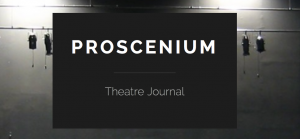I’ve been helping start a theatre journal called Proscenium that’s gearing up to publish plays and theatre-related articles for its inaugural issue this fall. The new journal aims to create the first free, online platform for sharing new plays. More information (and submission instructions) can be found at www.prosceniumjournal.com
The project’s been really rewarding to work on so far. The journal’s received submissions from authors all over the country, some with long production histories and others just starting, and it’s been fun reading and getting to be a part of the amazing work people are doing.
Proscenium sprang largely out of an absence of opportunities for new playwrights to publish their works outside of large publication organizations like Samuel French. And unlike these venues, Proscenium does not collect royalty cuts from authors – it obtains only one-time publication rights to the pieces it prints. The journal aims to create a new publication model for playwrights.
While there are a variety of literary magazines, journals, and other general publication outlets, there are currently very few similar publications for new theatre. As a result, there are likewise very few opportunities for undergraduates to publish dramatic work. And given the enormous volume of impressive dramatic writing happening at Puget Sound – through playwriting and creative writing classes, Student Initiative Theatre’s playwriting festivals and workshops, Ubiquitous They sketch comedy, and via the theatre department – we definitely encourage campus writers to submit to the journal.
Speaking of submissions, Proscenium is taking submissions up until its August 1st deadline for the fall issue. Plays can be sent to submissions@prosceniumjournal.com – please include a brief 100-word author bio and your piece as either a PDF or Word document. We’re looking in particular for short one-acts and ten minute plays to fill out this first edition.
Besides Proscenium, I’ve otherwise been busy editing XRDS, the national undergraduate magazine of the Association for Computing Machinery. I’m a feature editor for the magazine, which entails brainstorming authors and themes for the publication’s various issues, steering the general direction of the magazine, and lots of editing! I’ve been editing articles for our upcoming issue on natural language processing, an exciting fusion of language and computer science (at least for a dual biblio/technophile like myself). If you want to check out more about the magazine, go to: xrds.acm.org
Between the two magazines, I’ve definitely been forced to brush up on my editing skills! It’s also showing me, though, that there’s almost nothing more entertaining to someone who likes reading and writing then reading and revising new writing and helping bring writing to new audiences.

